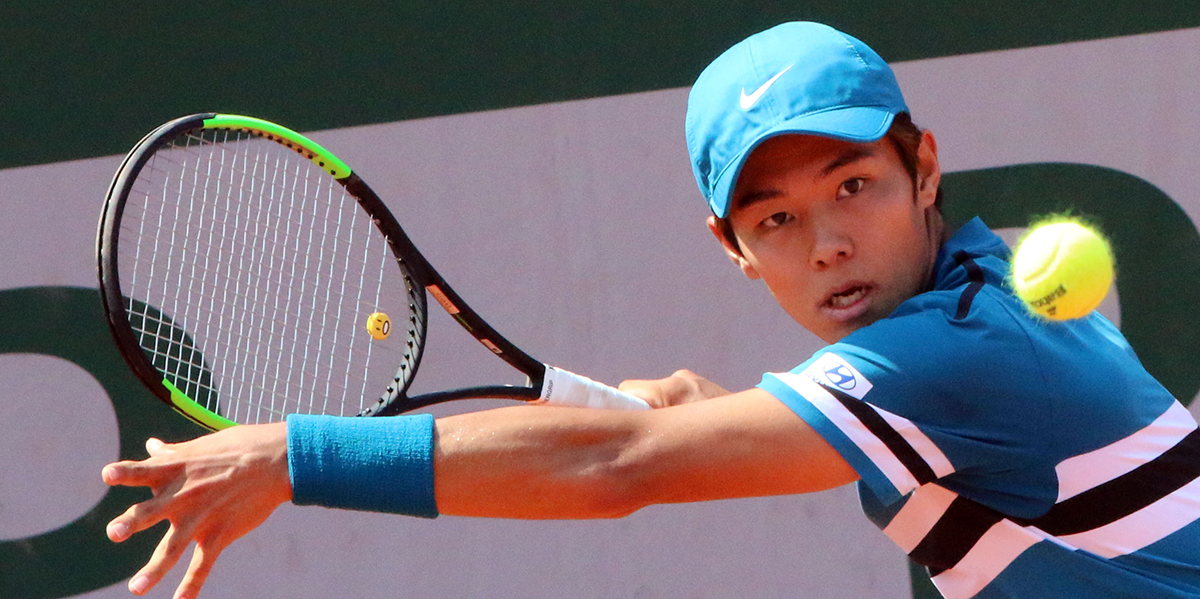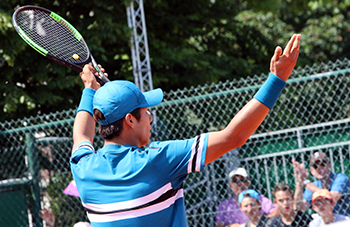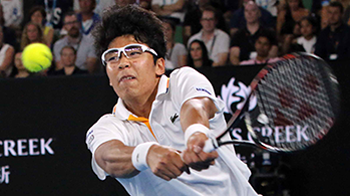
VISIONARY: Ever watchful, Lee Duck-hee eyes approaching ball in final round of qualifying at Roland Garros, where he lost in three sets to Spaniard Jaume Munar, 6-7 (3), 6-0, 7-6 (1).
VIEW AND DOWNLOAD WORLD TENNIS GAZETTE VOL. 10 NO. 3
By JOHN MARTIN
August 2018

LET ME HEAR YOU?: Imploring spectators to express their support, Lee raised his arms at Roland Garros. Deaf since birth, Lee held two match points against his opponent in the final round of qualifying, but victory slipped from his grasp. He lost in 3 sets.
PARIS —By the time he lost his final round qualifying match here at the 2018 French Open, Lee Duck-hee of South Korea had come within one point — the two match points he held and lost against his opponent — of reaching the main draw of a Grand Slam tournament for the first time.
What transpired next speaks of tragedy tinged with triumph.
First, Lee did not register for special status after the match and was denied entry to the main draw as a replacement when several players withdrew at the last minute due to injuries or illness.
Second, Jaume Munar, the player who beat him in the last round of qualifying, then pulled off a stunning upset in the main draw, defeating David Ferrer, a fellow Spaniard once ranked 3rd in the world.
The Ferrer upset suggested strongly that Lee Duck-hee, who had nearly defeated Munar, was fully capable of competing at top levels.
His failure to register for what is called Lucky Loser status suggested a momentary lapse between player and coach. But it proved costly. First round players receive a minimum of $46,700 even if they lose. This year no fewer than eight slots were filled by Lucky Losers. Lee Duck-hee was not among them.
Even so, Duck-hee’s defeat at Roland Garros, four days before his 20th birthday, left him on the doorstep of a breakthrough few had dared predict.
Lee is deaf, the only top level professional tennis player who cannot hear the twack of racket strings hitting the ball, the call of “let” from a chair umpire, or “out” by a lines person.
While most coaches and players believe this is an insurmountable obstacle to players seeking to perform at the highest level, the verdict is not unanimous.
In a remarkable portrait of Lee Duck-hee written two years ago for The New York Times, the tennis writer Ben Rothenberg found a competing vision.
“People who were born deaf or hard of hearing may have a stronger sense of intuition in general, and tend to see subtle clues in a person’s face or body language better than people with normal hearing,” said Paige Stringer, a deaf former college player who founded the Global Foundation for Children with Hearing Loss.
Stringer told Rothenberg that deaf players “are more visual because when one sense is compromised, other senses are heightened to compensate. If my hypothesis is correct, people who are deaf or hard of hearing may have an advantage in tennis because they can pick up visual cues faster and better as to their opponent’s plans, and may have better reflexes because they see things sooner.”
How much sooner? Milliseconds, said scientists Rothenberg consulted.
“According to research compiled by the National Institutes of Health last year,” Rothenberg told Times readers, “the mean reaction time to visual stimuli is 180-200 milliseconds, and 140-160 milliseconds for auditory stimuli.”
The difference may seem infinitesimally slight, but tennis is a sport of split seconds exploited or squandered. Lee’s visual acuity, developed from an early age, may have catapulted him to an unusually high level of physical prowess. If so, the time may not be far away when he will come into his own as an athlete.
Lee’s French Open showing raised expectations that he might make his way into the main draw at the next Grand Slam: Wimbledon. The qualifying rounds take place at Roehampton, a nearby club.
In a pre-tournament interview with the BBC, Lee said “I feel huge responsibility that my every step as a tennis player will influence other deaf people. I hope my career could give them a hopeful message that they could also overcome their disability and make their dream come true.”
“Whenever I step on the court, I feel great,” he told BBC Sports on the eve of the Roehampton event.
Looking ahead in time, he raised his sights: “I am curious about the feeling of becoming a champion of Grand Slam. I strongly believe that a day when I become a champion of a major tournament is coming if I keep up training and my skills improve.”

KOREAN SURGE? Hyeon Chung reached the 2018 Australian Open semifinals. In 2016, Lee lost to Chung in a final in Taiwan.
Within a day of the BBC interview, reality bit hard. Lee faltered, losing in the first round of the Roehampton qualifier to Attlla Balazs, a 29-year-old Hungarian ranked 167th in the world.
By late July, as he began to point his travels across the world toward Flushing Meadows, Lee’s ranking settled in the 230s.
Even so, given time, it’s possible Lee could be part of a surge in fortunes for South Korean tennis. In January, Chung Hyeon of South Korea reached the semi-finals of the Australian Open and was ranked 20th in the world. Two years earlier. Lee lost to Chung Hyeon in the final of a Challenger.in Kaohsiung, Taiwan.
When he lost in Paris in May, Lee Duck-Hee bowed his head slightly, walked to the net to shake hands with his opponent, then left the court.
On the walkway outside,, a fan gestured for permission to shoot a picture of Lee with his daughter, a toddler . Lee knelt, smiled, then stood and stepped into the maze of people at the rear of Suzanne Lenghlen Stadium.
It was a melancholy moment for a young man wrapped in dreams. As he descended steps to the locker rooms, I heard Paul Simon’s epic song, Sound of Silence:
“Hello darkness my old friend,
I’ve come to talk with you again.
Because a vision softly creeping
Left its seeds while I was sleeping
And the vision that was planted in my brain
Still remains
Within the sound of silence.”